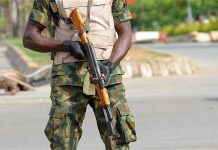United States lawmakers are stalling a proposed sale of attack helicopters to Nigeria amid mounting concerns about the Nigerian government’s human rights record as its military grapples with multiple security crises at once, Foreign Policy magazine reports.
The top Democrat and Republican on the Senate Foreign Relations Committee have delayed clearing a proposed sale of 12 AH-1 Cobra attack helicopters and accompanying defense systems to the Nigerian military, pausing a deal worth some $875 million, according to U.S. officials and congressional aides familiar with the matter.
The behind-the-scenes controversy over the proposed arms sale illustrates a broader debate among Washington policymakers over how to balance national security with human rights objectives.
The hold on the sale also showcases how powerful U.S. lawmakers want to push the Biden administration to rethink U.S. relations with Africa’s most populous country amid overarching concerns that Nigerian President, Muhammadu Buhari, is drifting toward authoritarianism as his government is besieged by multiple security challenges, including jihadist insurgency.
Nigeria is on the front lines in the battle against Boko Haram, one of the world’s deadliest terrorist groups, and plays a role in U.S. and international efforts to roll back extremist groups in the Sahel region of West Africa.
But Western governments and international human rights organizations have ramped up their criticisms of the Nigerian government, particularly in the wake of its ban on Twitter, systemic corruption issues, and the Nigerian military’s role in deadly crackdowns on protesters after widespread demonstrations against police brutality last year.
Sen. Bob Menendez, the chairperson of the Senate Foreign Relations Committee, called for a “fundamental rethink of the framework of our overall engagement” with Nigeria during a Senate hearing with U.S. Secretary of State Antony Blinken in June.
Both Menendez and Sen. Jim Risch, the top Republican on the Senate Foreign Relations Committee, have placed a hold on the proposed arms sale, according to multiple U.S. officials and congressional aides familiar with the matter, who spoke to Foreign Policy on condition of anonymity.
The details on the proposed sale were first sent by the U.S. State Department to Congress in January before then-former U.S. Vice President Joe Biden was inaugurated as president, according to officials familiar with the matter.
In addition to the helicopters, the proposed sale included 28 helicopter engines produced by GE Aviation, 14 military-grade aircraft navigation systems made by Honeywell, and 2,000 advanced precision kill weapon systems—laser-guided rocket munitions, according to information sent by the State Department to Congress and reviewed by Foreign Policy.
Nigeria has relied on U.S. arms sales in the past to help address multiple security challenges: the 12-year insurgency by Boko Haram militants in the country’s northeast, a spate of high-profile kidnapping-for-ransom campaigns targeting schoolchildren in the country’s northwest, and deadly clashes between the country’s semi-nomadic herders and farmers fueled by climate change and environmental degradation of the country’s arable land.
The State Department describes the U.S.-Nigeria relationship as “among the most important in sub-Saharan Africa” and has provided limited funding for various military training and education programs.
Some experts said the United States should hit the pause button on major defense sales until it makes a broader assessment of the extent to which corruption and mismanagement hobble the Nigerian military and whether the military is doing enough to minimize civilian casualties in its campaign against Boko Haram and other violent insurrectionists.
“There doesn’t have to be a reason why we don’t provide weapons or equipment to the Nigerian military,” said Judd Devermont, director of the Africa program at the Center for Strategic and International Studies, a think tank.
“But it has to be done with an assessment of how it will, one, change the direction of conflict in Nigeria, and, two, that they will use it consistent with our laws. In both cases, it’s either a question mark or a fail.”
“There is a culture of impunity that exists around abuses by the military,” said Anietie Ewang, the Nigeria researcher at Human Rights Watch.
Ewang cited the Nigerian military’s killing of unarmed protesters at Lekki toll gate in Lagos during the country’s massive #EndSARS demonstrations against police corruption and brutality last year as well as cases documented by human rights organizations of abuses in the military’s campaign against Boko Haram.
“I’m sure it’s a difficult situation. There are so many conflicts springing up across the country now,” Ewang said.
“The authorities, I presume, are trying to do the best they can to save lives and property. But this must be done in accordance with human rights standards. You can’t throw one out just to be able to achieve the other.”
Recall that the former U.S. President, Donald Trump’s administration agreed to sell the Nigerian government 12 A-29 Super Tucano warplanes, resurrecting a proposed sale the Obama administration froze after the Nigerian Air Force bombed a refugee camp that January. The first batch of those planes arrived in Nigeria earlier this month.




